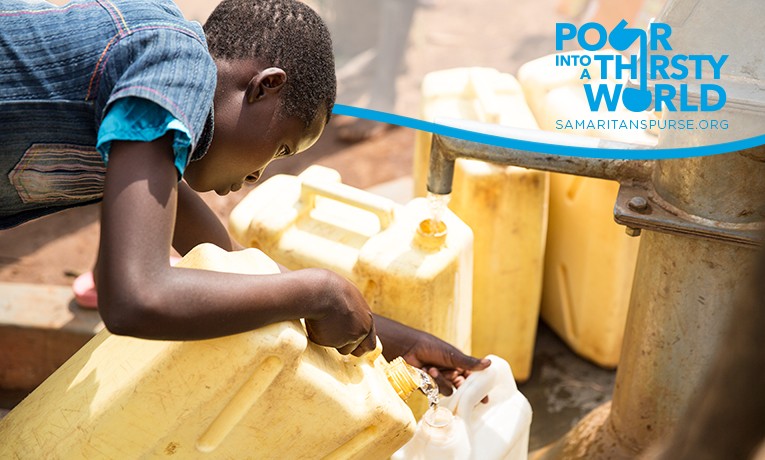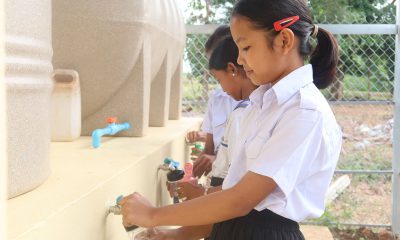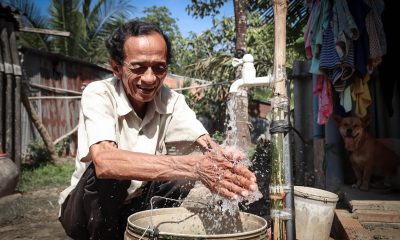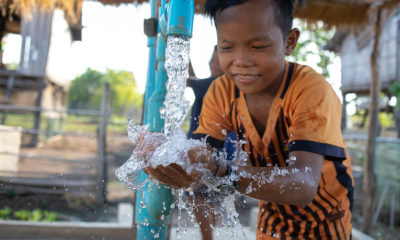Janet Strike Ausel, water and sanitation adviser, explains how Samaritan’s Purse is providing access to this precious resource
How many people in the world are living without access to clean water? Who bears the burden when clean water is not available? What problems arise when clean water is not available?
Globally, approximately 748 million people do not have access to improved water sources.
More than 500,000 people die each year from diarrheal diseases caused by unclean water, inadequate sanitation, and poor hygiene habits. The majority of these are children.
People who are sick from diarrheal disease cannot earn income (tend their gardens or go to work) and must spend the money they have on medicine. This money drain means they can’t provide adequately for their families, send their kids to school, etc. If children can’t study, they can’t raise their earning potential, and thus the cycle of poverty is perpetuated.
Women and girls are often sent to fetch water, many times at great distances. This means women can’t do other income-generating activities and girls can’t attend school.
What areas of the world have the greatest needs?
Sub-Saharan Africa and Oceania have the lowest coverage rates of access to improved water. The poorest 60 percent of the population in sub-Saharan Africa are largely denied the comforts and health benefits of a piped drinking water supply on premises.
How much water does a family of four typically need in one day?
At a minimum, a family of four needs 60 liters, or 16 gallons. A typical family of four in the West, however, may use over 400 liters per day, the equivalent of 105 gallons.
Where is Samaritan’s Purse actively focused on providing new access to clean water? What kinds of water sources are we providing? How many people are benefiting from our water projects?
In 2014, Samaritan’s Purse provided or restored access to water for approximately 440,000 people around the globe. In addition, last year we distributed more than 11,000 household filters, improving water quality for more than 42,000 people. A majority of our beneficiaries were in South Sudan and the Philippines.
We currently have water projects in 11 countries on three continents. We drill boreholes (also referred to as drilled wells), dig wells (generally done partially or wholly by hand), protect springs, build/provide rainwater storage tanks, and create/repair water pans. We also come alongside communities to repair their existing water sources and help train local technicians in keeping the water points clean and working.
How long does it take to complete a typical well project? How much does it cost?
The time required depends on many factors. Is the well drilled by machine or dug by hand? Is there water near the surface or is it deep below? Are we drilling through hard rock or soft soil? In general, once the equipment is there, a well can be installed in 10 days to a few weeks.
Costs vary by the factors above as well as by material prices and country-specific considerations. In some places we have our own drill rigs, such as South Sudan. Sometimes we use a contractor to partner with us to drill a well.
In Asia, we might drill a shallow well for a few hundred dollars but a deep, difficult well in Africa could cost more than $20,000!
How long can a drilled well last? How much water can it supply?
If it’s properly constructed and maintained, a borehole can last for decades. Although, if the well uses hand pumps, parts will have to be replaced as they wear out with normal use.
A hand pump should pump at least 17 liters (about 4.5 gallons) in a minute. In an area with high population density and/or few other sources of available water, the well might be pumped nearly constantly for up to 14 or 16 hours a day.
In South Sudan, a borehole well with a hand pump is expected to provide water for 60 families, about 300 to 400 people.
What are the biggest obstacles that Samaritan’s Purse faces when drilling wells/providing clean water access?
They vary from day to day and country to country. A few challenges include impassable roads in the rainy season, broken parts that have to be replaced out of country, and less-than-responsive government officials.
Why does Samaritan’s Purse include both sanitation and hygiene programs with most water projects?
A comprehensive approach makes the greatest health impact. If people have a good drinking water source but use the bushes for their latrine, there are still going to be significant health risks to them and their families. Likewise, if they drink clean water but never wash their hands they are still going to get sick on a regular basis.
What might a typical day be like for a member of one of our teams?
All over the world, our offices start the day with devotions and prayer. Then teams split up to go about their duties. A community mobilizer might jump on a motorbike and head into the bush for an hour. There she would sit down with community leaders to discuss an upcoming water project. A group of well technicians might travel to install the concrete pad around a newly drilled well and spend the day working with the community in partnership to prepare the slab. Or a hygiene trainer might spend the day teaching community health volunteers who will later reteach critical messages to larger groups of people.
How do water, sanitation, and hygiene projects open opportunities to share the Gospel?
Our Water, Sanitation, Hygiene (WASH) team members spend a lot of time in communities, building relationships with the people and sharing the Good News. In Kenya, for instance, more than 40 people have come to receive Christ as Lord and Savior through the Kitui WASH program in the past quarter.
How can supporters pray for our WASH teams?
Pray that they would be living testimonies of Christ’s love for the world, in word and action. They often work in difficult situations with people in desperate need, so please pray that they would be encouraged daily. Pray for wisdom for the WASH program managers in each country and for unity among their teams.




















































